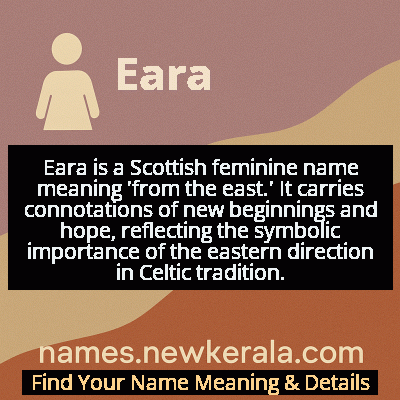Eara Name Meaning & Details
Origin, Popularity, Numerology Analysis & Name Meaning of Eara
Discover the origin, meaning, and cultural significance of the name EARA. Delve into its historical roots and explore the lasting impact it has had on communities and traditions.
Name
Eara
Gender
Female
Origin
Scottish
Lucky Number
7
Meaning of the Name - Eara
Eara is a Scottish feminine name meaning 'from the east.' It carries connotations of new beginnings and hope, reflecting the symbolic importance of the eastern direction in Celtic tradition.
Eara - Complete Numerology Analysis
Your Numerology Number
Based on Pythagorean Numerology System
Ruling Planet
Neptune (Ketu)
Positive Nature
Intuitive, analytical, spiritual, and inquisitive.
Negative Traits
Secretive, reserved, aloof, and can be overly critical.
Lucky Colours
Green, yellow.
Lucky Days
Monday.
Lucky Stones
Cat’s eye, moonstone.
Harmony Numbers
1, 5, 6.
Best Suited Professions
Scientists, researchers, spiritual leaders, detectives.
What People Like About You
Depth of knowledge, analytical skills, spirituality.
Famous People Named Eara
Eara MacPherson
Scottish poet
Known for her Gaelic poetry collections preserving Scottish cultural traditions
Eara Campbell
Textile artist
Revived traditional Scottish tartan weaving techniques and established a weaving school
Eara Fraser
Educator and historian
Founded the Scottish Heritage Education Program promoting Gaelic language and culture
Name Variations & International Equivalents
Click on blue names to explore their detailed meanings. Gray names with will be available soon.
Cultural & Historical Significance
During the Scottish Enlightenment and subsequent periods of emigration, the name traveled with Scottish diaspora communities to North America and Australia, where it maintained its cultural associations while adapting to new environments. The name represents a bridge between Scotland's ancient Celtic roots and its evolving identity through centuries of change. In modern Scottish culture, Eara serves as a reminder of linguistic heritage and the importance of preserving traditional naming practices that connect contemporary Scots to their ancestral past.
Extended Personality Analysis
Women named Eara are often perceived as possessing a unique blend of traditional values and forward-thinking perspectives. They typically demonstrate strong intuition and emotional intelligence, combined with practical wisdom that serves them well in both personal and professional contexts. Their name's eastern orientation suggests an openness to new experiences and cultures, making them adaptable and curious individuals. Earas are frequently described as having a calm, centered presence that others find comforting and reassuring.
They tend to be excellent listeners who offer thoughtful advice, often serving as mediators in conflicts. Their connection to heritage gives them a deep appreciation for tradition, while their 'eastern' symbolism encourages innovation and growth. This combination makes them particularly effective in roles that require balancing respect for the past with vision for the future. They typically exhibit patience, resilience, and a quiet determination that helps them navigate life's challenges with grace and purpose. Their symbolic association with the east also suggests they often play guiding roles in their communities, helping others find direction and meaning.
Modern Usage & Popularity
In contemporary times, Eara remains a relatively uncommon but cherished name, primarily used within Scottish communities and by those with Scottish heritage. The name has seen a modest resurgence in recent years as part of the broader trend toward reviving traditional Celtic names. While it doesn't appear on mainstream popularity charts, it maintains a steady presence in Scotland, particularly in areas with strong Gaelic cultural preservation movements. Modern parents choosing this name often appreciate its unique sound, cultural significance, and the positive symbolism of its 'eastern' meaning. The name is occasionally used in creative spellings or combined with more contemporary middle names to bridge tradition and modernity. Its rarity makes it appealing to parents seeking distinctive names with deep cultural roots that won't be shared by multiple children in the same classroom, while its meaningful background provides a rich narrative for the child's identity.
Symbolic & Spiritual Meanings
Symbolically, Eara represents direction, new beginnings, and the journey toward enlightenment. The eastern association connects it to sunrise, dawn, and the start of new days—making it emblematic of hope, renewal, and fresh starts. In metaphorical terms, the name suggests someone who brings light into darkness, offers guidance, and helps others find their way. The eastern orientation also symbolizes openness to different perspectives, cultural exchange, and the wisdom that comes from embracing diversity. In Celtic symbolism, east represents the element of air, associated with intellect, communication, and spiritual awareness. This gives the name additional layers of meaning related to clarity of thought, expressive ability, and spiritual insight. The name carries the energy of movement and progression, suggesting a personality that is never stagnant but always growing and evolving toward greater understanding and fulfillment, much like the perpetual journey of the sun from east to west.

